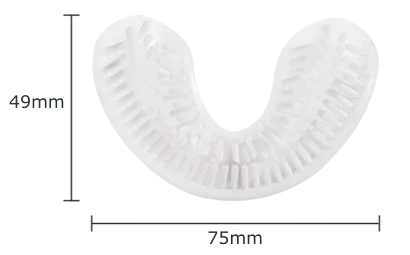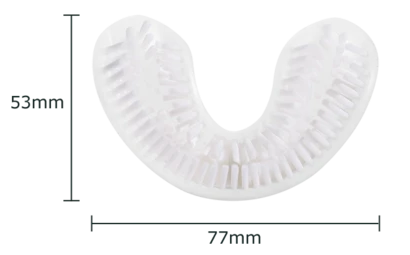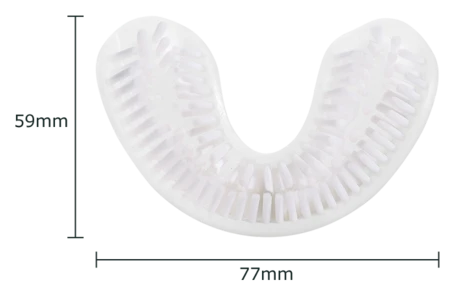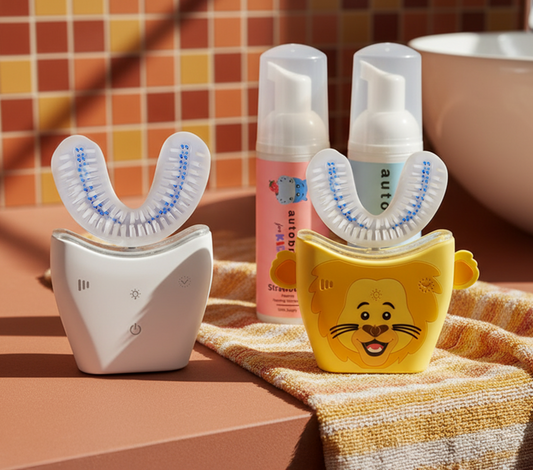
Canker Sores: How To Cure Them + Prevention
Canker sores are a common – and pesky – dental issue.
In this blog post, you’ll learn what canker sores are, what causes them, and how to cure them + gather some prevention tips to keep in your pocket.
What Are Canker Sores?
Canker sores are small, painful ulcers that can form on the inside of your mouth, tongue, and cheek. They're usually white or yellow and can be surrounded by a red inflamed area. Canker sores can range in size from a few millimeters to over an inch across.
It's no secret that canker sores are a nuisance, but they usually go away on their own within a week or two. If you find your sore doesn’t heal by then, you’re getting them frequently, or your canker sore is particularly large and painful, consult with your dentist on treatment options.
🦷️ Toothy Tip: While canker sores can be very painful, they're not contagious. You can't get them from kissing someone or sharing a drink with someone who has them. This is a common misconception.

What Causes Canker Sores?
There are several factors that may contribute to canker sore formation.
- Stress: Stress can weaken the immune system, making you more susceptible to canker sores.
- Celiac Disease: Celiac disease is an autoimmune disorder that damages the small intestine and interferes with the absorption of nutrients from food. People with celiac disease are more likely to develop canker sores because of the nutrient deficiencies that can occur with this condition.
- Hormonal Changes: Fluctuations in hormones can also trigger canker sores. This is most commonly seen during puberty, menstruation, or menopause. Hormonal changes often disrupt the immune system, making you more susceptible to canker sores.
- Dietary Deficiencies: Certain nutrients are important for maintaining healthy mucous membranes. When these nutrients are deficient, it can lead to the development of canker sores. Common nutrient deficiencies that can contribute to canker sores include iron, folate, and vitamin B-12.
- Eating Acidic or Abrasive Foods: Foods that are high in acidity can cause canker sores and make them worse. Examples of acidic foods include citrus fruits, tomatoes, and pineapple. Abrasive foods can also cause canker sores to develop or become more painful. These include chips, pretzels, popcorn, and sour candies.
- Allergies: People who are allergic to certain foods or ingredients may be more susceptible to canker sores. Allergens that can trigger canker sores include gluten, cow’s milk, eggs, and nuts.
- Medication: Certain medications, such as beta-blockers and nonsteroidal anti-inflammatory drugs (NSAIDs), can make canker sores more likely to develop. This is because these medications can cause changes in the lining of the mouth, making it more susceptible to injury and infection.
Canker Sore Symptoms
Since canker sores often appear on the inside of the cheek, lips, and tongue– they can be easily irritated during day-to-day activities. Individuals with canker sores typically experience a burning and painful sensation while trying to eat or talk.
As mentioned above, most canker sores heal on their own within two weeks without leaving a scar. However, some people struggle with chronic canker sores that last for more than two weeks.
Canker Sore Treatment

Canker sores can be pesky and irritating, but don't worry; there are ways to treat them! If you do develop canker sores, try one of the following:
- Apply a Topical Cream or Ointment: Topical creams and ointments can help speed up the healing process of canker sores. However, some over-the-counter creams and ointments can actually make canker sores worse. Consult with your dentist before applying any creams inside the mouth.
- Use Mouthwash: Mouthwashes can help speed up the healing process by killing off bad bacteria in the mouth. If you don’t have a mouthwash or find the alcohol in your mouthwash too irritating, try rinsing the mouth with warm salt water.
🦷️ Toothy Tip: Did you know that AutoBrush's foaming toothpaste also doubles as a mouthwash? It airy formula is gentle on the mouth, but powerful against plaque and bad bacteria.
- See Your Dentist or Doctor: If your canker sore does not go away within two weeks or is causing severe pain, you should see your dentist asap. They are the best resource to help treat your canker sores.
Canker Sore Prevention
While canker sores are curable – nobody wants to deal with one. Therefore, like most dental issues, prevention is key! Below are several things you can do to prevent canker sores.
- Avoid Spicy, Acidic, or Salty Foods. Spicy, acidic, or salty foods can trigger canker sores. This is because these foods can break down the mucous membranes in your mouth, making them more susceptible to infection.
- Avoid Stress. Stress can cause canker sores. When you are stressed, your immune system is weakened, which puts you at a higher risk of developing a canker sore. If you notice you are developing canker sores frequently, try reducing the amount of stress in your life by exercising, meditating, or spending time doing the things you love.
- Practice Good Oral Hygiene. Brushing and flossing regularly can help prevent canker sores. This is because it removes the bacteria and food particles that can irritate the mouth.
🦷️Toothy Tip: Tongue scrapers are also a beneficial dental tooth that can remove excess build-up of bacteria and food particle from the tongue. Not only does this help promote a healthy mouth, but also promotes fresher breath throughout the day. Click here to shop tongue scrapers.
- Use a Toothbrush With Soft Bristles. A toothbrush with soft bristles can help prevent canker sores. This is because a toothbrush with hard bristles can damage the mucous membranes in your mouth, making them more susceptible to infection.
🦷️Toothy Tip: The AutoBrush Pro: Kids soft nylon bristles have been clinically proven to help kiddos clean their teeth 27x better than manual toothbrushes. See our clinical study results here.
- Quit Smoking and Using Tobacco Products. If you smoke or use tobacco products regularly, you're more likely to develop canker sores. Tobacco products can damage the mucous membranes in your mouth, putting you at a greater risk of infection in the mouth.
- Use a Mouth Rinse. Mouth rinses can help kill the bacteria that cause canker sores.

FAQs on Canker Sores
Can Dental Work Cause Canker Sores?
Yes, dental work can cause canker sores in some people. Dental work irritates the tissue in your mouth which can trigger the formation of a canker sore. On the same note, if you already have a canker sore, avoid getting dental work done until it’s healed to prevent further irritation.
Do Vitamins Help Cure Canker Sores?
Vitamin B12 can help with canker sores. Vitamin B12 helps to heal the tissue in your mouth and can also help to prevent canker sores. You can get vitamin B12 from eating foods such as meat, fish, eggs, and dairy products or by taking a vitamin B12 supplement.
What Causes Canker Sores in Kids?
There are several possible causes of canker sores in kids, such as stress, food allergies, and mouth injuries. If your child is struggling with chronic canker sores, speak with their pediatric dentist for help identifying the cause.
Do Canker Sores Spread?
Canker sores do not spread from person to person. However, if you have a canker sore, you may be more likely to get another one in the future.
Conclusion
Getting canker sores can be painful and annoying. However, there are ways to prevent them and treat them. If you are prone to canker sores, try to avoid triggers such as stress and mouth injuries. You can also take vitamin B12 supplements to help prevent canker sores. If canker sores do not heal within two weeks, or if they are large and painful, you should see a doctor.












